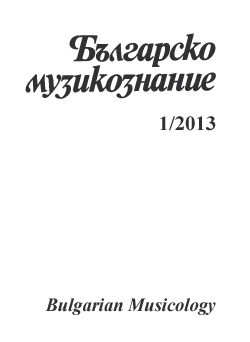Клер Леви: „Музикалната пародия в края на 20 и началото на 21 век“
Claire Levy: “Musical Parody at the late 20th and early 21st century”
Author(s): Angelina PetrovaSubject(s): Music
Published by: Институт за изследване на изкуствата, Българска академия на науките
Summary/Abstract: True to her ability to explore musical trends from new and unexpected angles, Claire Levy examines the puzzling world of metaphors which shape the referential nature of parody. Her new monograph is not only an insightful achievement in musical scholarship but also a fascinating account which stimulates critical reflections on what is observed on the multi-coloured terrain of contemporary musical culture. Taking notes on why parody became a hot issue in art scholarship, especially once the concept of postmodernism turned out to be an accepted way to talk about modern forms of self-reflexivity, the author interprets the growing affinity to parody in contemporary culture as a sign of particular stylistic orientations of people, tempted not so much by the didactics of one-sided messages, but rather by the metaphorical potential of playful, slippery and multi-layered aspects implied in the “double meaning”. The main thesis here insists on a broader understanding of contemporary parody. It is argued that parody today performs not only the ridiculous effect of “distorting mirror” but also the self-reflexive ironic gestures of positive reverence and innovating attitude to musical conventions and cultural memory. Employing as a starting theoretical point the Bakhtinian concept of dialogism, Levy defines the essense of musical parody (described, generally, as a repetition with difference) through the intersection of critical concepts of inversion, intertextuality, irony, as well as subjective aspects of listener’s reception and interpretative reading. Analises here reasons her thesis and move across a range of repertoires observed in popular music, music video, film music, and music on theatrical stage – to illustrate perspectives of funcional range of modern parody: from the role of signifying codes of cultural memory to carnival rhetoric, from what she calls inverted melodarama to those ironic approaches which innovate musical conventions within particular traditions and prompt entirely new trends in music. No doubt, “Musical Parody” points to the intriguing contours of a new interdisciplinary field in Bulgarian musicology and brings perspectives of a valuable contribution to the cultural study of music.
Journal: Българско музикознание
- Issue Year: 2013
- Issue No: 1
- Page Range: 81-84
- Page Count: 4
- Language: Bulgarian
- Content File-PDF

